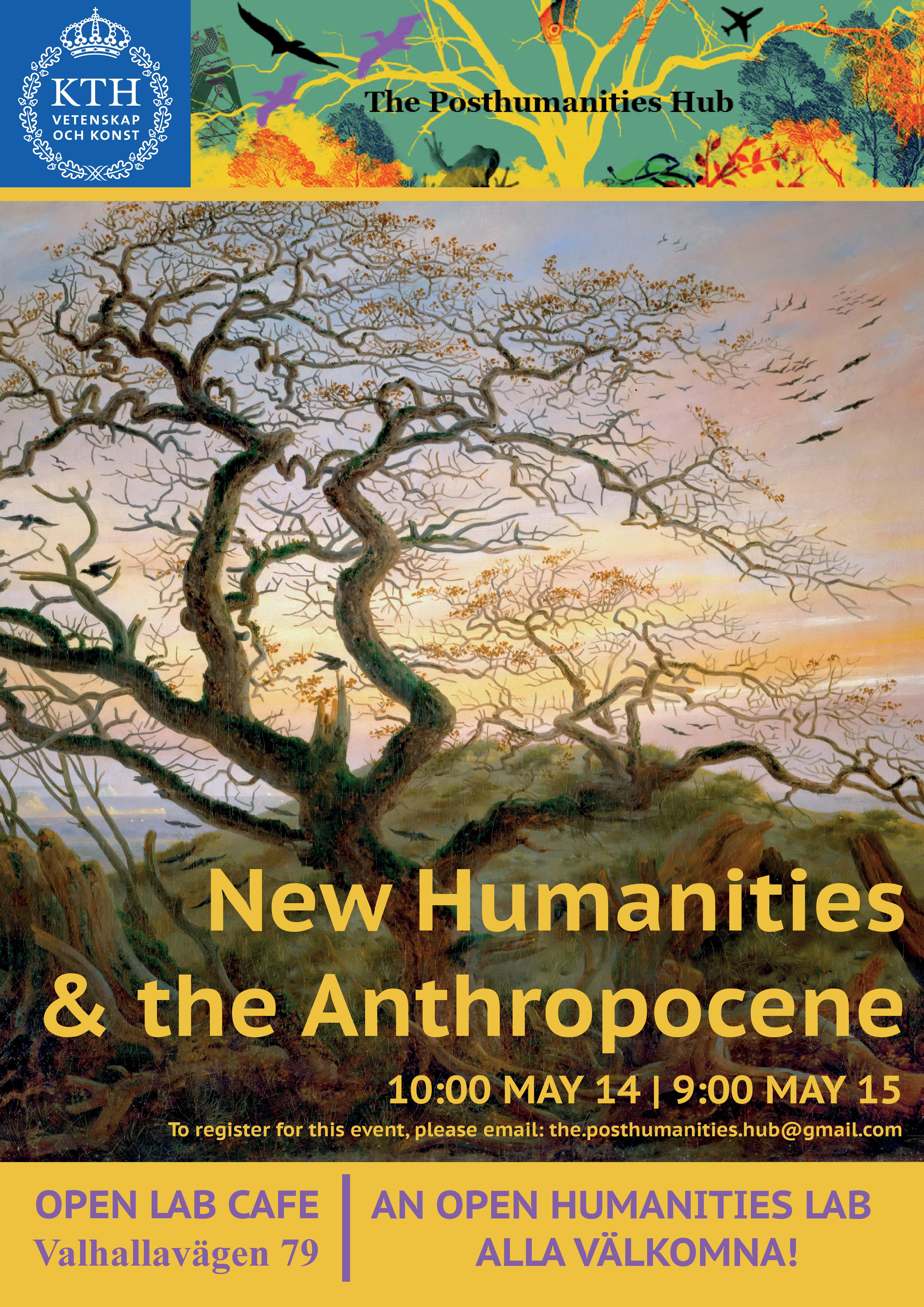Welcome to the Open Humanities Lab Symposium: New Humanities & the Anthropocene, taking place on 14th & 15th May at Openlab, Stockholm.
In order to register for the event, please send an email to: the.posthumanities.hub[at]gmail.com
New Humanities & the Anthropocene (Uncertainty, response-ability and humankind)
Now, the environment is in us, and we humans are fully in the environment: that much is clear in this new planetary era of uncertainty some call the Anthropocene. This new geological period, the environmental ‘Age of Man’, is often defined by unparalleled human disturbance of the Earth’s ecosystems, climate, and biodiversity. Almost half of the wildlife on Earth has been lost in the past forty years. Perhaps we will soon have spawned more transgenic organisms, synthetic biological systems, hybrid creatures or artificial intelligences than we ever asked for. In the age of the Anthropocene, humans have become a ‘force of nature’, making nature – in its classical sense – over. The old idea of Universal Man in its classical and imagined sense of a bounded individual, safely zipped up in a white skin of his own, guided by rational thought rather than sociability, preconceptions and desires, along with his anthropocentrism seem dated, if not down-right detrimental to our planetary existence. Conventional divides between nature and culture, sex and gender, body and technology, human and animal, and between science and society, have collapsed.
During the past several decades, emerging research in the humanities has turned its attention to subjects that were previously conceived as ‘not human enough’: women, queers, children, migrants, people of colour, elderly, and other groups. Simultaneously, popular culture, technologies, animal subjects, insects, plants, whole ecosystems, along with all kinds of human and more-than-human infrastructures, call for our attention. After all, values, purpose, existential conditions and sociocultural formations that are historically sustained, or not, on local or larger scales, are the expertise of the humanities (and its sibling social sciences). The human exceptionalism of the humanities is increasingly abandoned in favour of planetary ethics, societal accountability, and a more-than-human humanities of conviviality. We witness now the exciting emergence of new humanities, responding to present societal challenges.
How can the humanities accommodate the transformations associated with advances in science, technology, medicine, with the Anthropocene and the ‘great acceleration’ of planetary damage following suit with ’progress’ and ‘growth’? Is there a solidarity in our precarious diversity as we now all have to learn to live with the wounds of the world, to live on a damaged planet? Can we, like Timothy Morton, re-imagine kindness in its human and more-than-human sense? How can the new humanities, like environmental humanities, feminist bio-philosophy, cyborg studies, architectural philosophy, multispecies studies, eco-art, citizen humanities, gender studies, human-animal studies, plant theory, techno-humanities, media studies and digital humanities, respond to the challenges of the Anthropocene? Such forms of posthumanities – or new humanities – often share a sense of belonging in a world not divided across nature and culture, arts and sciences. For new humanities, postdisciplinary bridge-building and collaborations are crucial. So is responsibility, response-ability, and situated knowledges, as Donna Haraway and decades worth of feminist theorising on what gets to count as human or natural remind us.
Can the new humanities, transformative and integrative in nature, become not just relevant to society but also enact real change? Can we have research that is participatory, communicable, and, as Rosi Braidotti puts it, ‘worthy of our times’?
Come join the conversation on uncertainty, response-ability, and humankind in the age of the Anthropocene, and see if the new humanities’ cultivation of attentiveness, curiosity, care, concern, and critique can do something for you, co-existentially with others.
Warmly welcome to an open dialogue amongst various artists, scholars, educators, citizens, academic activists, and journalists, a symposium where we break bread together in public and forge new brave alliances in the face of the unexpected!
After all, humanities is for everybody.
Speakers:
Katja Aglert, independent artist and researcher, SE
Marco Armiero, KTH, SE
Rosi Braidotti, Utrecht University, UK
Christine Daigle, Brock University, CA
Hayden Lorimer, University of Glasgow, UK
Christina Fredengren, Stockholm University, SE
Hélène Frichot, KTH, SE
Matthew Fuller, Goldsmiths, UK
Myra Hird, Queen’s University, CA
Janna Holmstedt, KTH, SE
Lauren LaFauci, Linköping University, SE
Nina Lykke, Linköping University, SE
Tara Mehrabi, Karlstad University, SE
Norie Neumark, LaTrobe University, AU
mirko nikolić, independent artist, SE/FI
Jesper Olsson, Linköping University, SE
Marietta Radomska, Linköping University, SE/University of Helsinki, FI
Lina Rahm, Linköping University, SE
Margrit Shildrick, Stockholm University, SE
Sverker Sörlin, KTH, SE
Lotten Wiklund, journalist, SE
Cecilia Åsberg, KTH, SE/Linköping University, SE
UPDATE (13.05):
The registration for the event is now CLOSED as we have reached the capacity of the venue. There might be a few spots left in case anyone from the registered participants cancels last minute.

One response to “Open Humanities Lab Symposium: New Humanities & the Anthropocene (14-15 May)”
Daejm! missed it